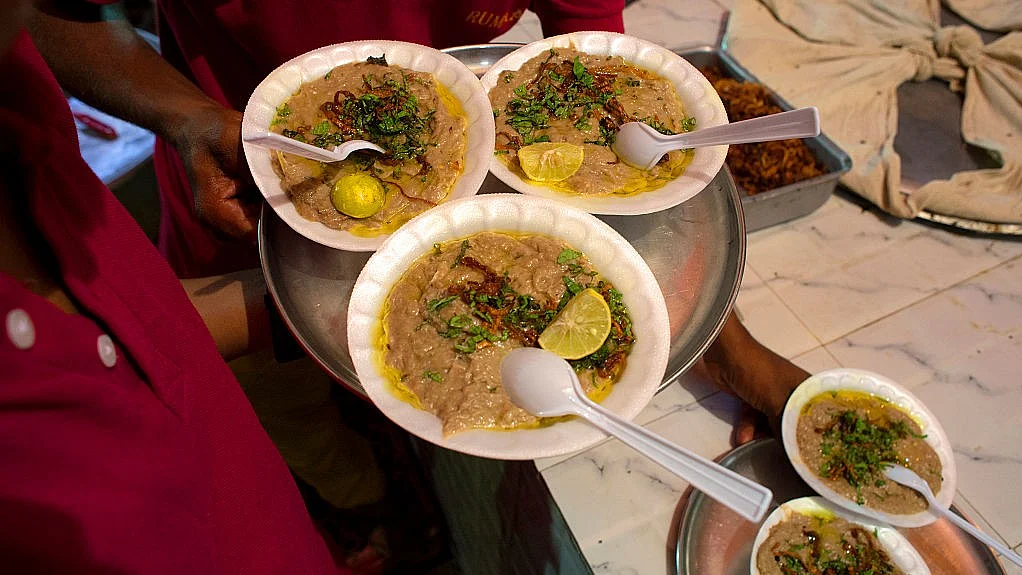Ramzan is the best time for a plate of delicious Hyderabadi haleem
The holy month of Ramzan is incomplete in Hyderabad without the city’s famous dish of haleem, a spicy stew of meat, dals and wheat, favoured by rozedars for breaking their daily Ramzan fast, or roza

The Muslim holy month of Ramzan is incomplete in Hyderabad without the city’s famous dish of haleem, a stew of meat, dals and wheat mixed with spices. Haleem is favoured by rozedars for breaking their daily Ramzan fast, or roza, due to its energising nature and high nutritional value.
Every Ramzan, Hyderabad sees a huge jump in the sale of fruit and the traditional fast-breaking item, dates. Stalls selling fried items, kebabs and dahi bade do brisk business. But no dish can match the city’s craze for haleem, which trumps even biryani—the signature dish of Hyderabad—during the fasting month.
Driving around the city, you will come across "bhattis" or brick-and-mud ovens in front of almost every hotel and roadside eatery, for preparing haleem. For anywhere between ₹30 to ₹160 per plate, Hyderabadi haleem is available for every pocket.
It is not just Muslims breaking their fast who make a beeline to the old city’s popular eateries like Pista House, Shah Ghouse and Sarvi for a taste of haleem during Ramzan. As swanky cars slow down outside the food outlets at Yousuf Tekri in Toli Chowki, dozens of young caterers scramble to get closer to the vehicles to take orders. Sitting in their cars, young techies, businessmen, families and tourists can be seen relishing the piping hot haleem. Every evening, and till the early hours of the day, traffic chaos reigns supreme on this busy road which connects to the IT hubs of Hitech City and Gachibowli.
While the situation is no different in many areas in the old city of Hyderabad, some of the central parts of the city, the chaos in Toli Chowki highlights the intense competition among leading haleem makers.
Origins of Hyderabadi haleem, which earned a Geographical Indication marker in 2010
Originally an Arabic dish, haleem is said to have been introduced to Hyderabad kitchens, via Iran and Afghanistan, during the Mughal period. The porridge-type dish was Indianised with the addition of spices, dry fruit, ghee and a unique style of cooking.
Chefs with their assistants are seen engaged through the day in the laborious process of making the sumptuous dish in large vessels cemented on the bhattis. The entire cooking process, spanning about 10 hours, is done on firewood.
At every eatery, one can spot two or more men mixing the ingredients and pounding the meat in the vessels with large wooden poles. The pounding ensures that the mixture turns into fine paste. It is served after being garnished with special spicy shorba (meat broth), caramelised onions, coriander, slices of lemon. Some also to sprinkle sliced boiled eggs, green chillies and ginger, mint leaves and fried cashewnuts on top of the haleem.
Haleem comes in all variants—mutton, beef, chicken, fish, vegetarian. Every Hyderabadi hotel claims to have its own unique taste. Some serve the haleem in their own style by topping it with fried pieces of chicken, "zaban" (goat's tongue) and egg.
The dish gained huge popularity over the last two decades thanks to the efforts of Pista House, a now global brand which claims to be the largest haleem maker in the world. Pista House secured Geographical Indication (GI) status for Hyderabadi haleem in 2010. This means that only haleem made in Hyderabad can be called Hyderabadi haleem.
"When we started in 1998, we sold haleem for ₹18 per plate," Managing Director of Pista House MA Majeed told IANS. Today, Pista House sells the dish at around 200 outlets in Hyderabad, Bengaluru and Chennai, and delivers haleem during Ramzan to customers in other major cities in India through courier.
"This year, we have introduced whole wheat haleem. We use whole wheat grain among other mostly natural and finest quality ingredients. We use less spices. This is exactly the same way haleem is prepared in Saudi Arabia," said Majeed.
Follow us on: Facebook, Twitter, Google News, Instagram
Join our official telegram channel (@nationalherald) and stay updated with the latest headlines
